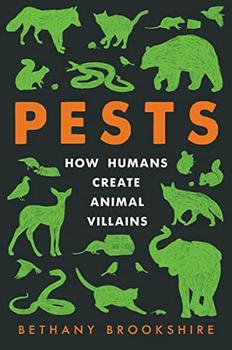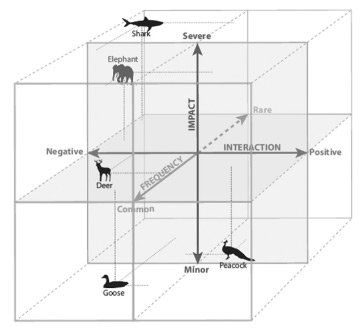Summary | Excerpt | Reviews | Beyond the Book | Readalikes | Genres & Themes | Author Bio

How Humans Create Animal Villains
by Bethany Brookshire
The animals took advantage, and the squirrel orgy began. They damaged local forests. They gobbled up bird eggs. This was a crime of the highest order to the Victorians, Holmes says, because if they took bird eggs, there were fewer left for the avid Victorian egg collector. Within a century, the red squirrel seemed doomed to a life of dodging gun-toting foresters and angry naturalists.
Until the mid-twentieth century, red squirrels remained unpopular bird-egg munching villains. But as the century wore on, the Scots (and the English) saw their native red squirrel come under attack from the Americans. Not people. Squirrels. Sciurus carolinensis, our Eastern gray squirrel, was introduced from the Americas to English and Scottish woodlands in 1876. An army of Kevins quickly took over with a truly American sense of Manifest Destiny. The squirrel also carried squirrelpox, which gray squirrels can resist but reds cannot. Fluffy red tails began, once again, to disappear.
charitable sense of conservation—that idea didn't really exist yet. The aristocrats just liked the look of the landscaping—and the money it could bring in from hunting tourism in their new parks. As rich people were more and more able to separate themselves from the worst the wild could send, it became much easier to appreciate its beauty. They brought back squirrels and their habitat in their new enthusiasm for nature.
The animals took advantage, and the squirrel orgy began. They damaged local forests. They gobbled up bird eggs. This was a crime of the highest order to the Victorians, Holmes says, because if they took bird eggs, there were fewer left for the avid Victorian egg collector. Within a century, the red squirrel seemed doomed to a life of dodging gun-toting foresters and angry naturalists.
Until the mid-twentieth century, red squirrels remained unpopular bird-egg munching villains. But as the century wore on, the Scots (and the English) saw their native red squirrel come under attack from the Americans. Not people. Squirrels. Sciurus carolinensis, our Eastern gray squirrel, was introduced from the Americas to English and Scottish woodlands in 1876. An army of Kevins quickly took over with a truly American sense of Manifest Destiny. The squirrel also carried squirrelpox, which gray squirrels can resist but reds cannot. Fluffy red tails began, once again, to disappear.
A squirrel in your garden, or nesting in your roof, is an annoyance. Something that we should, at the least, control, and at the worst, eradicate.
This means that the idea of a pest is very much in the eye of the beholder. "I remember as an undergrad taking a course in sustainable agriculture," says Philip Nyhus, a professor of environmental studies at Colby College in Maine. "The professor pointed out the terminology of pest and [asked], 'Why is this plant a pest and this other one that looks just like it is not a pest?' Because somebody has decided that one plant is useful to eat ... or has some economic value. And the other one's essentially impinging on that." The impression the professor made was lasting. Nyhus is still fascinated by human conflict with animals.
Some conservationists might say a pest disrupts a natural ecosystem. Not everyone would agree. English ivy, after all, lends gravitas to a facade, but strangles native plants and rips bricks apart. An outdoor house cat is snuggly little Fluffy in the sheets and a murderer in the streets. Cats kill between one and four billion birds a year in the contiguous United States. But most cat owners get pretty upset if you start calling their beloved Fluffy a pest. The distinction between "pest" and "not pest" is entirely subjective.

This figure, from Nyhus's 2016 review article "Human-Wildlife Conflict and Coexistence," shows the different ways that people react to the animals around them.
Excerpted from Pests by Bethany Brookshire. Copyright © 2022 by Bethany Brookshire. Excerpted by permission of Ecco. All rights reserved. No part of this excerpt may be reproduced or reprinted without permission in writing from the publisher.
Your guide toexceptional books
BookBrowse seeks out and recommends the best in contemporary fiction and nonfiction—books that not only engage and entertain but also deepen our understanding of ourselves and the world around us.